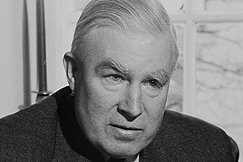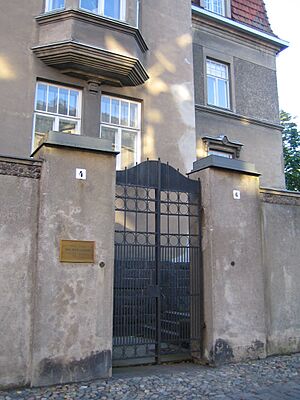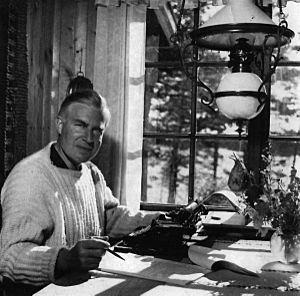Georg Henrik von Wright facts for kids
Quick facts for kids
Georg Henrik von Wright
|
|
|---|---|

von Wright in 1972
|
|
| Born | 14 June 1916 |
| Died | 16 June 2003 (aged 87) Helsinki, Finland
|
| Education | University of Helsinki (1934–1937, 1939–1941; PhD, 1941) University of Cambridge (graduate student, 1939) |
| Era | 20th-century philosophy |
| Region | Western philosophy |
| School | Analytic philosophy |
| Institutions | University of Cambridge University of Helsinki Cornell University |
| Academic advisors | Eino Kaila |
| Doctoral students | Jaakko Hintikka |
|
Main interests
|
Modal logic, philosophy of action, philosophy of language, Epistemology, philosophy of science |
|
Notable ideas
|
Deontic logic Myth of Progress |
|
Influenced
|
|
Georg Henrik von Wright (born June 14, 1916 – died June 16, 2003) was a famous Finnish philosopher. He was known for his deep thinking about how we make decisions and what is right or wrong. He also explored how we understand the world around us.
Contents
Life and Early Career
Georg Henrik von Wright was born in Helsinki, Finland, on June 14, 1916. His parents were Tor von Wright and Ragni Elisabeth Alfthan. His family had roots in both Finland and Scotland. They were even made part of the Finnish nobility in 1772.
Becoming a Professor
Von Wright studied at the University of Helsinki. He later became a very important philosopher. In 1948, when he was just 32 years old, he was chosen to be a professor at the University of Cambridge. He took over this role from another famous philosopher, Ludwig Wittgenstein.
Languages and Background
Von Wright could speak and write in many languages. He published his ideas in English, Finnish, German, and Swedish. He was part of the Swedish-speaking minority in Finland.
Von Wright's Philosophical Work
Von Wright's ideas can be divided into two main areas. One area focuses on how we use logic and reason to understand things. The other area looks at questions about right and wrong, and whether society is truly making progress.
Logic and Reasoning
In his work on logic, von Wright was a leader in a field called analytic philosophy. This type of philosophy uses careful thinking and logic to solve problems. He wrote important books in 1951, like An Essay in Modal Logic. He also wrote about "deontic logic", which is a special kind of logic that deals with duties and permissions.
He was an expert on the writings of Ludwig Wittgenstein. Von Wright even helped to edit some of Wittgenstein's later works. He was also a key figure in Finnish philosophy. He studied many topics, including the philosophy of action (why people do what they do) and the philosophy of language (how language works).
Ideas on Morality and Progress
Later in his life, von Wright became more interested in questions about morality and society. He wondered if the world was truly getting better. He was influenced by thinkers like Oswald Spengler and Jürgen Habermas.
One of his most famous articles from this time was called "The Myth of Progress" (1993). In this article, he questioned whether our advances in technology and material things really mean we are "progressing". He made people think about what true progress actually means.
Awards and Recognition
Georg Henrik von Wright received many honors during his life. In 1968, he was given the Swedish Academy Finland Prize. In his last year, he also received several honorary degrees from universities, including the University of Bergen.
See also
 In Spanish: Georg Henrik von Wright para niños
In Spanish: Georg Henrik von Wright para niños



